
Urology, also known as genitourinary surgery, is the branch of medicine that focuses on surgical and medical diseases of the urinary-tract system and the reproductive organs. Organs under the domain of urology include the kidneys, adrenal glands, ureters, urinary bladder, urethra, and the male reproductive organs.
VUI or Vui or variation, may refer to:

Prostatectomy is the surgical removal of all or part of the prostate gland. This operation is done for benign conditions that cause urinary retention, as well as for prostate cancer and for other cancers of the pelvis.
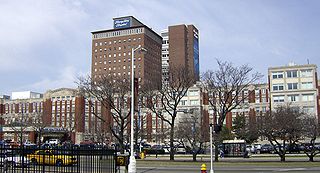
Henry Ford Hospital (HFH) is an 877-bed tertiary care hospital, education and research complex at the western edge of the New Center area in Detroit, Michigan. The flagship facility for the Henry Ford Health System, it was one of the first hospitals in the United States to use a standard fee schedule and favor private or semi-private rooms over large wards. It was the first hospital in the country to form a closed, salaried medical staff. As founder Henry Ford viewed tobacco as being unhealthy, the hospital was one of the first in the United States to institute a total ban on smoking. Henry Ford Hospital is staffed by the Henry Ford Medical Group, one of the nation's largest and oldest group practices with 1,200 physicians in more than 40 specialties.
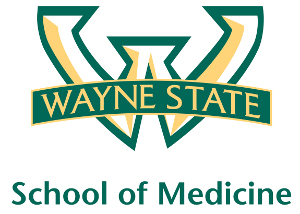
The Wayne State University School of Medicine (WSUSOM) is the medical school of Wayne State University, a public research university in Detroit, Michigan. It enrolls more than 1,500 students in undergraduate medical education, master's degree, Ph.D., and M.D.-Ph.D. WSUSOM traces its roots through four predecessor institutions since its founding in 1868.
Beaumont Health was Southeast Michigan’s largest health care system and was headquartered in Southfield, Michigan. It merged with Spectrum Health of West Michigan in 2022 to form Corewell Health, with the headquarters of the new health system being located in Grand Rapids. At the time of its merger, the health system had a net revenue of $4.7 billion and consisted of eight hospitals with 3,375 beds, 155 outpatient sites, nearly 5,000 physicians, more than 33,000 employees and about 2,000 volunteers. The flagship hospital of the system was the Beaumont Hospital, Royal Oak, located in the Detroit suburb of Royal Oak, Michigan.

David B. Samadi is an American urologist, a Newsmax contributor, and the former Chairman of Urology and Chief of Robotic Surgery at Lenox Hill Hospital.
Urology Robotics, or URobotics, is a new interdisciplinary field for the application of robots in urology and for the development of such systems and novel technologies in this clinical discipline. Urology is among the medical fields with the highest rate of technology advances, which for several years has included the use medical robots.

Mahendra Bhandari is an Indian surgeon who has made substantial contributions to the specialty of urology, medical training, hospital administration, robotic surgery and medical ethics. For his efforts, he was awarded the Padma Shri by the government of India in 2000. Bhandari is currently Senior Bio-scientist and Director of Robotic Surgery Research & Education at the Vattikuti Urology Institute (VUI) in Detroit, MI. He was the Symposium coordinator of the International Robotic Urology Symposium. He also has been the CEO of the Vattikuti Foundation since 2010.
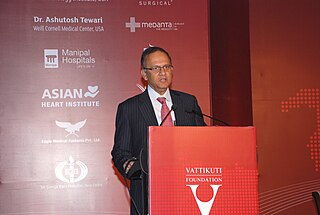
Mani Menon, born 9 July 1948 in Trichur, India, is an American surgeon whose work has helped to lay the foundation for modern Robotic Cancer Surgery. He is the founding director and the Raj and Padma Vattikuti Distinguished Chair of the Vattikuti Urology Institute at the Henry Ford Hospital in Detroit, MI, where he established the first cancer-oriented robotics program in the world. Menon is widely regarded for his role in the development of robotic surgery techniques for the treatment of patients with prostate, kidney, and bladder cancers, as well as for the development of robotic kidney transplantation.
Menon is the recipient of the Gold Cystoscope award, Hugh Hampton Young award, the Keyes Medal, the prestigious B.C. Roy award.

Ashutosh K. Tewari is the chairman of urology at the Icahn School of Medicine at Mount Sinai Hospital in New York City. He is a board certified American urologist, oncologist, and principal investigator. Before moving to the Icahn School of Medicine in 2013, he was the founding director of both the Center for Prostate Cancer at Weill Cornell Medical College and the LeFrak Center for Robotic Surgery at NewYork–Presbyterian Hospital. Dr. Tewari was the Ronald P. Lynch endowed Chair of Urologic Oncology and the hospital's Director of Robotic Prostatectomy, treating patients with prostate, urinary bladder and other urological cancers. He is the current President of the Society for Urologic Robotic Surgeons (SURS) and the Committee Chair of the Prostate Program. Dr. Tewari is a world leading urological surgeon, and has performed over 10,000 robotically assisted procedures using the da Vinci Surgical System. Academically, he is recognized as a world-renowned expert on urologic oncology with over 250 peer reviewed published papers to his credit; he is on such lists as America's Top Doctors, New York Magazine's Best Doctors, and Who's Who in the World. In 2012, he was given the American Urological Association Gold Cystoscope Award for "outstanding contributions to the field of urologic oncology, most notably the treatment of prostate cancer and the development of novel techniques to improve the outcomes of robotic prostatectomy."
Simon J. Hall is an American researcher who is the Associate Professor and Kyung Hyun Kim, M.D. Chair of Urology and Assistant Professor, Department of Gene and Cell Medicine at The Mount Sinai School of Medicine, as well as the Director of the Barbara and Maurice Deane Prostate Health and Research Center at The Mount Sinai Medical Center, both in New York City.

Roger Sinclair Kirby FRCS(Urol), FEBU is a British retired prostate surgeon and professor of urology, researcher, writer on men's health and prostate disease, founding editor of the journal Prostate Cancer and Prostatic Diseases and Trends in Urology and Men's Health and a fundraiser for prostate disease charities, best known for his use of the da Vinci surgical robot for laparoscopic prostatectomy in the treatment of prostate cancer. He is a co-founder and president of the charity The Urology Foundation (TUF), vice-president of the charity Prostate Cancer UK, trustee of the King Edward VII's Hospital and as of 2020 is president of the Royal Society of Medicine (RSM), London.

Craig G. Rogers, is an American urologist and the Chair of Urology Vattikuti Urology Institute at the Henry Ford Hospital in Detroit, Michigan. Rogers is known for pioneering minimally invasive robotic kidney surgeries using da Vinci Surgical System including single incision robotic surgeries. He was the first surgeon to utilize ultrasound probe in robotic kidney surgery. On February 9, 2009, he performed the first twittered live robotic surgery.
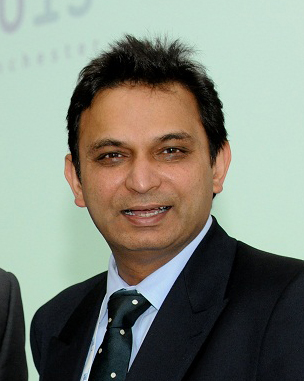
Prokar Dasgupta is an Indian-born British surgeon and academic who is professor of surgery at the surgical academy at King's Health Partners, London, UK. Since 2002, he has been consultant urologist to Guy's Hospital, and in 2009 became the first professor of robotic surgery and urology at King's, and subsequently the chairman of the King's College-Vattikuti Institute of Robotic Surgery.

Vipul R. Patel, FACS is the founder and Medical Director of the Florida Hospital Global Robotics Institute, founder and Vice President of the Society of Robotic Surgery, and founder and Editor Emeritus of The Journal of Robotic Surgery. He is board certified by the American Urological Association and specializes in robotic surgery for prostate cancer. As of June, 2023 he performed his 17,000th robotic-assisted prostatectomy. The large volume of prostatectomies he has performed has enabled him to amass a large amount of statistical evidence regarding the efficacy of robotic techniques which has been used in developing and refining techniques. Patel credits the use of robotic assisted surgery with helping surgeons achieve better surgical outcomes with the "trifecta" of cancer control, continence and sexual function. In the course of his career Patel has led and participated in studies that have resulted in developing improved outcomes for robotic surgery and urologic treatment.
Raj Vattikuti is an American-Indian entrepreneur, business executive and philanthropist. He is the Founder and Chairman of Altimetrik Corp. He is also the founder of Vattikuti Foundation. through which he is involved in many charitable causes. Previously, he was Founder and CEO of Covansys Corp., an IT services company, which was acquired by Computer Sciences Corporation in a $1.3 billion deal.
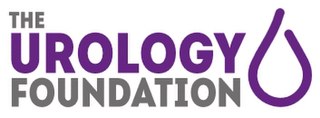
The Urology Foundation (TUF) is a charity that works across the UK and Ireland with the aim of improving the knowledge and skills of surgeons who operate on diseases of the male and female urinary-tract system and the male reproductive organs and funds research to improve outcomes of all urological conditions and urological cancers.

Benjamin James Challacombe is a British consultant urological surgeon at Guy's & St Thomas' Hospitals, and at King’s College London, who specialises in the treatment of kidney and prostatic disease using robotic surgery. In 2005, he was part of the team that published the results of a randomised controlled trial of human versus telerobotics in the field of urology and renal transplant, one of the first of its kind.
Anthony James Costello, FRACS, FRCSI, is an Australian urologist. He served as head of the department of urology at the Royal Melbourne Hospital, Australia. He established the first robotic prostate cancer surgery programme in Australia and published the first series of men who had laser surgery for benign prostate enlargements.














